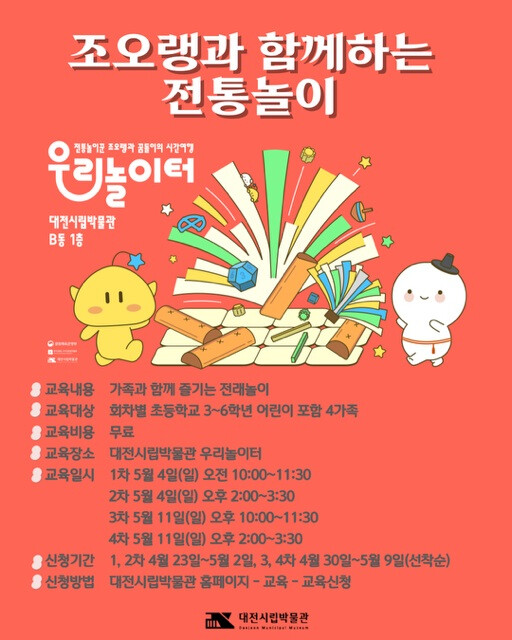
DAEJEON, SOUTH KOREA - In a heartwarming initiative to celebrate May Family Month, the Daejeon Museum of Art is hosting an engaging educational program titled ‘Traditional Games with Joraeng.’ This program offers families a unique opportunity to immerse themselves in Korean culture by participating in traditional games like Yut Nori and Ssangnyuk Nori.
Building on the success of its inaugural run in 2024, ‘Traditional Games with Joraeng’ takes place within the museum’s dedicated traditional play experience space, aptly named ‘Uri Playground’ (Our Playground). The program has quickly become a popular attraction, providing a hands-on experience of Korea’s rich cultural heritage.
This year, the museum will conduct the program over four sessions, scheduled for May 4th (Sunday) and May 11th (Sunday) at 10:00 AM and 2:00 PM each day. Each session aims to foster intergenerational communication and harmony by organizing the games in a friendly family competition format. This approach allows participants of all ages to connect through the shared joy of play and learn about Korean traditions in an interactive way.
Yut Nori, a game with roots tracing back to Korea's Three Kingdoms period (57 BC – 668 AD), was initially used as a form of fortune-telling, predicting the bounty of the new year's harvest. Over time, it evolved into a beloved national pastime, particularly enjoyed during Lunar New Year celebrations. The game involves throwing four wooden sticks to advance tokens along a board, blending strategy with chance. Its cultural significance is deeply embedded in Korean society, symbolizing family unity and shared traditions.
Ssangnyuk Nori, another featured game, is a dice-based board game with a history that parallels the Tables family of games, which includes Backgammon. While its exact origins in Korea are less definitively dated than Yut Nori, historical records and artifacts suggest its presence during the Joseon Dynasty. Ssangnyuk involves strategic movement of pieces based on dice rolls, offering a different flavor of traditional Korean amusement.
The Daejeon Museum of Art’s initiative goes beyond mere entertainment. By providing a dedicated space and organized program for these traditional games, the museum actively contributes to preserving and promoting Korean cultural heritage. These games, often played during traditional holidays and family gatherings, embody the spirit of community and shared cultural identity. Introducing them in a museum setting offers both local families and potentially tourists a valuable insight into Korean customs and the importance of play in Korean social life.
The program has garnered positive feedback for its interactive nature and its ability to bridge generational gaps within families. Participants not only learn the rules of the games but also experience the joy and camaraderie that these traditional pastimes have fostered for centuries. The ‘Uri Playground’ serves as an ideal setting, creating a welcoming and engaging environment for this cultural exchange.
The Daejeon Museum of Art is accepting applications on a first-come, first-served basis for a maximum of four families per session. Interested families can register through the museum’s official website starting from April 23rd. The museum encourages those interested to visit their website for detailed information and to secure their participation in this enriching family experience.
This initiative by the Daejeon Museum of Art underscores the vital role that cultural institutions play in preserving and promoting intangible cultural heritage. By actively engaging the community, particularly families, in these traditions, the museum ensures that these vibrant aspects of Korean culture continue to thrive and be appreciated by future generations. The ‘Traditional Games with Joraeng’ program is not just about playing games; it's about fostering cultural understanding, strengthening family bonds, and creating lasting memories rooted in Korean heritage.
[Copyright (c) Global Economic Times. All Rights Reserved.]






























